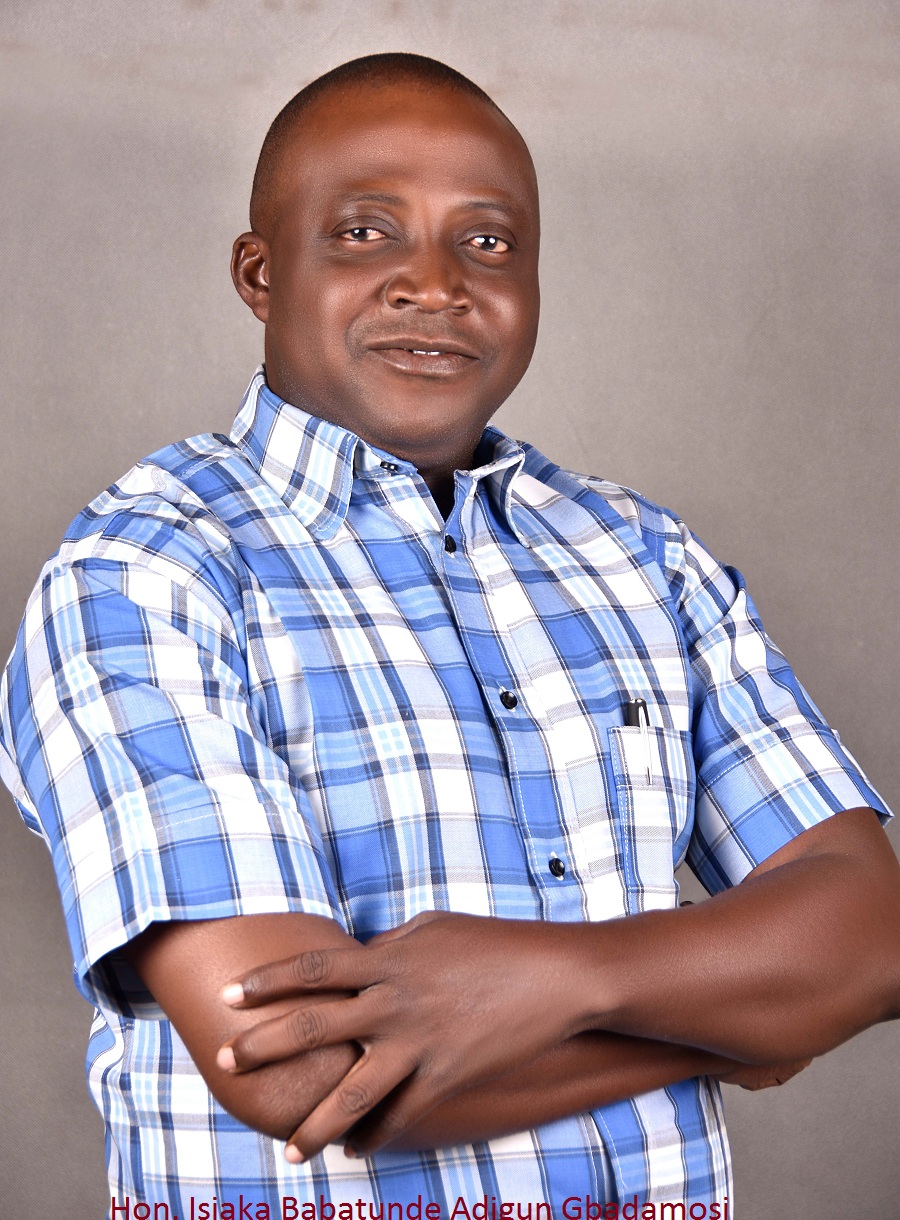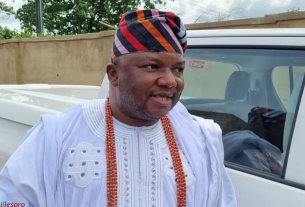By Yinka Fabowale
With a rainbow of academic qualifications that include a degree in History and International Relations, Journalism training, Cooperative Management, and a Higher National Diploma (HND) from The Polytechnic, Ibadan, a 28-year public service career and activism in students, cooperative and labour unionism, Hon. Isiaka Babatunde Adigun Gbadamosi, the Social Democratic Party (SDP) candidate for the House of Representatives election in Akinyele/Lagelu Federal Constituency, Oyo State, appears to have been cut out for the assignment he hopes people of the area will entrust him with their votes next month.
The retired civil servant and founder of Advocate for Mutual Support and Self-Sustenance Initiative (AMSSI), a Non-Governmental Organization (NGO) involved in economic empowerment of Nigerians at the grassroots, believes he is the best man to represent and help lift the fortunes of the people of the partly agrarian and partly semi-urban province comprising of two local government areas in Ibadan, the state capital in the National Assembly.
Gbadamosi, 46, who retired about a year ago from the Ministry of Defence where he helped found a vibrant and profitable Staff Agricultural Cooperative Society (MODACS), said to be the largest network of co-operators in the country with a membership of 4,000 members benefitting and of which he is the President, says he hopes to use his rich and vast educational background, as well as experience and leadership skills as a former student leader at the Polytechnic, labour unionist in the ministry, and financial expertise in growing the cooperative society from a membership of 32 persons and first savings contributions cheque of N91 in 2005 into a profitable venture from which thousands of Nigerians across the 36 states of the federation benefit, to give quality representation and empower people of his constituency if elected.
Living within the community coupled with the activities of his NGO, which involve interventions in form of empowerment, training and advocacy for self-help has, he said, afforded him insights into the critical needs of the people, which, he listed to include fixing infrastructure deficit, providing jobs, vocational training and scholarship for youths, as well as economic empowerment of artisans, traders, farmers to, in his words: create huge economic hub of opportunities that will banish poverty and enable the people expand their businesses and make a decent living.
Besides facilitating agro allied industries and storage facilities to check post harvest losses by farmers, as well as providing conducive environment for cattle business and peaceful coexistence between herdsmen in Kara, Trailer Park and other suburbs, Gbadamosi also hopes to create a wealth basket, which can assist small business holders with credit facilities to boost their trades, similar to what MODACS did for members in the Ministry of Defence.
If we can replicate what we did at the national level at the grassroots, it will be a huge boost because we will be mobilizing a huge fund. I was talking about the agrarian areas, most of these places do not have anything like financial inclusion, like bank.
The closest you have in Akinyele Local Government Area is in Ojoo, First Bank, that is the closest. After that, you can go as far as Iroko which is very far. You can go as far as Eboda, you can go as far as Olanla and Ijaye. There is nothing!
So, the issue is how do we get this financial inclusion to make the people plug into the system and tell them that, look if we work together we can help ourselves?
Most of our women essentially are into buying and selling and those are the areas where I feel the financial inclusion will work magic because if we can put them in a database and kind of profile them, we will know what they are doing and how they are doing it and be able to see if we can have a kind of savings/cooperative credit scheme and all of that by the time we establish their consistency and seriousness.
Gbadamosi also plans to work with the neighbourhood landlords associations to improve the problems of lighting, drainage, flooding and bad roads, common in the semi urban sections of the constituency that spans two local government areas in Ibadanland.
Another of his major missions if elected into the National Assembly would be to sponsor bills towards reducing poverty among Nigerians.
Specifically, he says, governments economic empowerment and interventions at alleviating poverty are in need of legislative reforms to properly structure them to be more effective.
His words: “I am looking at how we can create a system of cooperative within the country that is going to create a kind of economic dynamics within the system so that the people themselves are now empowered greatly.
The government continues to make a mistake, whereby they will tell you Go and form cooperatives, we give you money. Most times, those monies are largesse, free money that do not come back. But how do you identify those ones that are functional and see how you support them along that line.
Then, how do you put them into legislation incorporating them within the microfinance system. Today, we have the microfinance banks and the laws are there, but what can you really achieve them. In most cases, the law subsumes the cooperatives under microfinance banks, but do you know the interesting part of the story?
Most successful cooperatives are far bigger than microfinance houses to the extent that most of them own microfinance houses. So you need to rethink this whole thing because if you structure the cooperative society very well it can go ahead to create a very big enterprise because cooperative itself is an enterprise., it is not about merely giving loan and taking loans. No!
It is an enterprise that should be able to fill in the gap in areas where government cannot meet to support the economic system.”
He also stresses the need for strategic collaboration among the key institutions working in this regard, especially the Bank of Industry (BOI), Small/Medium Scale Enterprise of Nigeria, the Central Bank and Bank of Agriculture (BOA) to achieve greater result.
These four agencies most times are all working for diverse purposes and there is need for us to have a synergy among them, whereby people who trained with SMEDAN, after the training, aren’t told that, thats all we can give.
There should be a kind of referral from SMEDAN to maybe Central Bank or to Bank of Industry or to Bank of Agriculture to give necessary support, so it makes it easy for all the stakeholders to achieve tangible results on investment.However, one major obstacle confronts the SDP candidate.
Aside being a new entrant into politics, his choice of political platform on which he is contesting may be a drawback to realizing his ambition.
Since 2003 when the Lam Adesina administration was swept out of power, the SDP seems to have receded in the power equation in Oyo State.But the widely travelled Ibadan politician harbours no fear.
He believes the party remains popular especially among the electorate especially in Akinyele/Lagelu, who benefitted from massive construction of rural roads and infrastructural development under the party-led government of Kolapo Ishola in the short-lived Third Republic.
Ishola constructed all the rural roads in this area within a period of just one year and three months in office!
So, they reckon that if a man like that could do all that within such short space of time, then it means that people who come from this party must be of integrity, have good luck and mean well for the people.
The same thing with Chief M.K.O Abiola when he was elected, the national economy started blossoming, the prices of goods started reducing in the market and there was this kind of good omen until when it was annulled.
So, SDP has this good fortune of having people with very good intention and care for the people, the plight of Nigerians in mind. That is exactly what we intend to push, says Gbadamosi, while explaining the efforts to reposition the party for electoral victory.
Luckily, the politician, who speaks Hausa fluently in addition to English and his native Yoruba is deploying his grasp of the language garnered while schooling in Bauchi and Gombe to win support of the populous Arewa community in Shasha, Kara, Trailer Park areas.
He says his understanding of their language and culture engenders a sense of affinity, trust and confidence in the people towards him, stressing that he hopes to exploit same to build bridges among colleagues from other ethnic groups in the National Assembly if elected.
“I know the fears of these people; I know how they perceive us here. I know the people of the East perception of those of us in the West. I understand all the interplay, so that will help me in order to navigate the waters and create reassurance.Gbadamosi says he has also succeeded to a large extent with the people in his campaign against vote-buying.
The message is sinking. And so people will say are you using some magic and I will say there is no magic to it, what we are doing essentially is being honest… We are believing that by the grace of God come February 16, they will go out there and vote massively for us because they can see our sincerity.
This may be the first time we are coming out, but we intend to do things differently, really make a positive difference in the lives of our people and reposition our community.”
- Yinka Fabowale is the Editorial Board Chairman of The Radiance.





